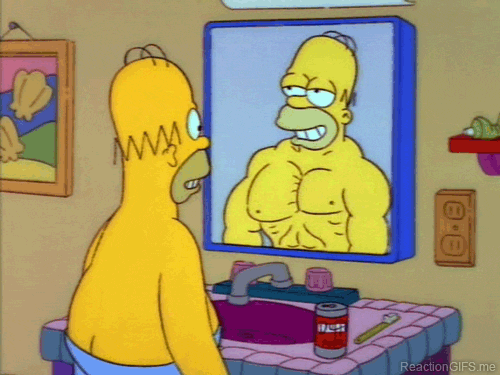Looking good? Your brain might be playing tricks on you

Your brain can make a psychological illusion with your body image, making you think you are a bit thinner or fatter than you really are.
Feeling thinner these days? Or just the opposite? Well, don't trust the image in your mirror too much. It could just be your brain playing tricks on you.
Your brain blends information from the past and the present to create an amenable reality. This mechanism, known as serial dependence, is a trick your mind plays to help you cope with change.
Now, a new study led by Jason Bell from the School of Psychological Science at the University of Western Australia found that this psychological mechanism may also be acting on our body image perceptions.
Mirror, mirror …
To address this issue, Jason recruited 103 young female undergraduate psychology students. The students had to rate a set of images of female bodies that ranged from underweight to obese. Using computer-generated body images, they used an unmarked scale to select how fat or thin a body image seemed to them.
The results provided strong evidence of serial bias in perceived body size. This means that students' size judgements were being influenced by the previously viewed body image.
"The research demonstrates human observers are often poor at estimating their own body size and the size of others. Crucially, body size judgements are not always accurate and can be biased by various factors. Sometimes it's influenced just by the people we stand next to," says Jason.
"As a person's weight increases above the average, so too does the likelihood that their prior experience involves smaller bodies. Because the brain combines our past and present experiences, it creates an illusion whereby we appear thinner than we actually are," Jason says.
Improving weight loss schemes
"These findings have important implications for weight loss approaches, including our chances of dieting successfully. What makes this particularly interesting from a health perspective is that misperceiving body size is a common symptom of eating disorders or obesity," Jason says.
The main point is that you need to touch base with reality and be aware of your real body condition. "Ideally, we'd like to correct these illusions so people are able to make an accurate assessment of their weight and whether it has changed for better or worse."
Future studies may also look at yet another dimension of this psychological bias: whether our ideal self also plays a role. "It isn't clear whether mental imagery [imagining our ideal self] may play into this illusion," says Jason.
Thus far, this has not been tested, and setting up such an experiment may be difficult, Jason explains. But it might be an interesting idea to explore. "Prior information is biasing our judgements. Thinking about a body type would activate body representation centres in the brain, and thus it is plausible that this may also contribute to the illusion."
Australia is currently facing rising obesity rates. According to official figures, more than 60% of adult Australians and 25% of children are overweight or obese.
This is a worrisome figure. As obesity rates increase, people's chances of developing many diseases also increase. Conditions like diabetes, heart disease and even reduced life expectancy are associated with obesity. So anything you can do to control that waistline is worth doing.
This article first appeared on Particle, a science news website based at Scitech, Perth, Australia. Read the original article.



















